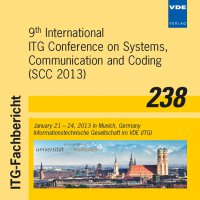PG-LDPCC Codes in Turbo Equalizer Systems - A Study on the Influence of Design Parameters of Terminated Convolutional Protographs
Conference: SCC 2013 - 9th International ITG Conference on Systems, Communication and Coding
01/21/2013 - 01/24/2013 at München, Deutschland
Proceedings: SCC 2013
Pages: 6Language: englishTyp: PDF
Personal VDE Members are entitled to a 10% discount on this title
Authors:
Grosa, Patrick; Fettweis, Gerhard (Vodafone Chair Mobile Communications, Dresden University of Technology (TU Dresden), 01062 Dresden, Germany)
Abstract:
This paper deals with the study of parameter variations of protograph-based low-density parity-check convolutional codes (PG-LDPCCC) for a transmission system incorporating linear mapping and the turbo equalization approach. LDPCCCs in general raised a lot of attention recently due to their very good error correction performance. In this work the focus lies on codes derived from protographs due to the opportunity to use a tool called density evolution for the analysis. In order to produce convolutional variants two different parameters (syndrome former memory ms, termination length L) play an important role. Throughout this paper, the influence of these parameters is analyzed by means of EXIT-Charts andMonte-Carlo-Simulations and their influences on the unwrapped graph are discussed. Although both parameters have an impact on the shape of transfer curves, and therefore on the overall performance, the memory has a more dominant effect on the shape, especially at the start of the iterative process when a-prioi information is low. However in order to reduce the rate loss, which depends on both parameters, for a fixed permutation size and ms, the termination length L must be increased which in turn increases the code length. Index Terms — LDPC Convolutional Codes, Turbo Equalizer, Protographs, Parameter Study, Syndrome Former Memory, Termination Length, Density Evolution, EXIT-Charts.


